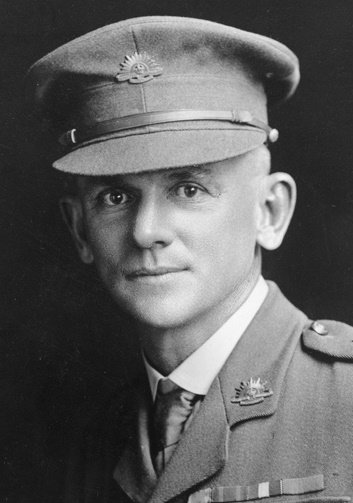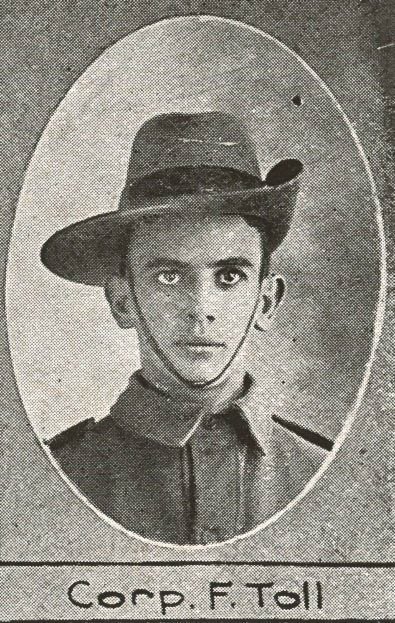Frederick William TOLL
Eyes unknown, Hair unknown, Complexion unknown
Lieutenant Colonel Frederick William Toll, DSO with bar, VD
Lieutenant Colonel Frederick William Toll (1872-1955) had a long career with the volunteer militia in the Kennedy Infantry Regiment, the Australian Naval and Military Expeditionary Force (ANMEF) and the First Australian Infantry Forces. He was a highly decorated soldier who led the 31st Battalion at Fromelles and we have outlined his military service within the context of his military honours.
Volunteer Officer’s Decoration (VD)
Frederick began his voluntary military career as a cadet at Brisbane Grammar School. After school, he became an accountant and, in 1892 aged 20, he was granted a commission in the Kennedy Infantry Regiment, a north Queensland based volunteer militia. He was promoted to captain in 1897 and in 1900 volunteered to serve in South Africa during the Boer Wars, returning home in 1902, , serving with the 2nd Queensland Contingent (Feb – Dec 1900) and with the 5th Queensland Imperial Bushmen Contingent (Apr 1901 – Apr 1902).
In 1913, he was awarded the Colonial Auxiliary Forces Officer’s Decoration, commonly referred to as the Volunteer Officer’s Decoration.
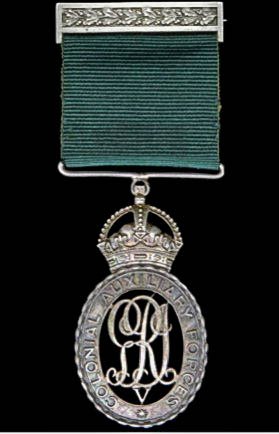
Volunteer Officer’s Decoration awarded for: recognition for long and meritorious service as a part-time commissioned officer in any of the organized military forces of the British Colonies, Dependencies and Protectorates.
Awarded to: Officers of Reserve – Captain and Brevet Major F. W. Toll
Authority: Commonwealth Government Gazette 20th March 1913 Issue no: 19, page 715
South Africa – Mentioned in Despatches, QSA and KSA medals
In January 1900, Frederick embarked for South Africa and was involved in a number of battles. He was appointed Provost-Marshal and commanded the troops returning to Brisbane in December 1900.
He went to South Africa a second time in April 1901. Promoted to major, he distinguished himself during actions in the Cape and Orange River colonies and the Transvaal and was honoured with a mention in despatches. Major Toll returned home to Queensland in April 1902.
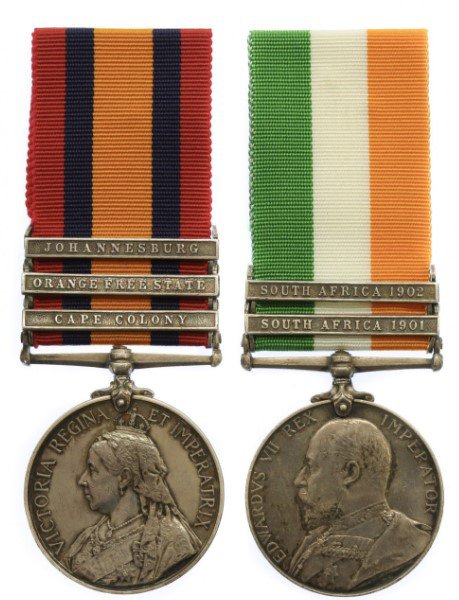
Mentioned in Despatches – For the resolute and capable way in which he led his regiment on four separate occasions in November, December and January
Awarded to – Corps, rank, name: 5th Queensland Imperial Bushmen - Major F. W. Toll
Authority: The London Gazette, April 25, 1902 – Number 27428, page 2767
Medals: Queen’s South Africa Medal (with 5 clasps) and King’s South Africa Medal (with 2 clasps)
The Great War 1915 - New Guinea
Enlisting on 7th November 1914 at 42 years, Frederick was commissioned with the rank of major in the 3rd Battalion, Australian Naval and Military Expeditionary Force (ANMEF). He embarked for what was then German New Guinea and was appointed officer commanding the troops in Rabaul and promoted to lieutenant-colonel on 1st March 1915.
On those occasions when the administrator was absent, Lieutenant-Colonel Toll acted as administrator of New Guinea. He left the ANMEF 3rd Battalion in August 1915 after being appointed to the AIF in July 1915.
The Great War 1916 – Egypt and Fromelles - AIF, 31st Battalion
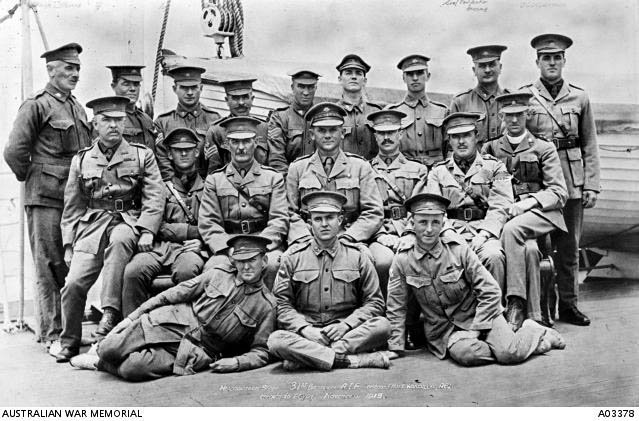
On transferring to the AIF, Toll was given command of the newly formed 31st Battalion. The Battalion left for Egypt in November 1915 on board HMAT A62 Wandilla and HMAT A41 Bakara. After six months service in Egypt, they embarked for France in June 1916.
The AWM Collection (U51471) describes the battalion’s first action:
“The 31st Battalion fought its first major battle under Toll at Fromelles on 19 July 1916, having only entered the front-line trenches 3 days previously. The attack was a disastrous introduction to battle for the 31st - it suffered 572 casualties, over half of its strength. Although it still spent periods in the front line, the 31st played no major offensive role for the rest of the year.”
Probably the best summary of Toll’s involvement during 1916, particularly at Fromelles (noted below as nearby Petillon) can be seen in the particulars outlined in the recommendation for his first World War 1 mention in despatches and for his award for the Distinguished Service Order. Dated 12th October 1916, Brigadier-General E. Tivey, 8th Infantry Brigade stated:
“This Officer has been with the Brigade since its formation and has always done his duty in a most conscientious and efficient manner.
During the operations in the Suez Canal Zone he was untiring in his efforts to obtain a high standard of efficiency and has always been an example to his Officers and men.
Lt. Colonel Toll displayed great gallantry all through the operations of 19/20th July 1916, at Petillon. He was slightly wounded at the commencement of the action and before the assault was made and he lost heavily in Officers and men. He led the 3rd and 4th waves over the parapet himself. Before reaching the enemy trenches 13 officers has (sic) been killed or wounded, including three Company Commanders. Lt Colonel Toll personally took charge and pushed on, making vigorous efforts to consolidate the position won, reconnoitring the enemy’s defences and taking prisoners. On the retirement he organised the troops on our original front line.”
Distinguished Service Order: – His Majesty the KING has been pleased to confer the Distinguished Service Order for gallantry and distinguished service in the field
Awarded to – Corps, rank, name: AUSTRALIAN IMPERIAL FORCE, Lt.-Col. Frederick William Toll
Authority: (Gazettal) The London Gazette, 29th December, 1916 – Supplement No. 29886, p. 28
Mentioned in Despatches: – An officer who has “served under my command, whose distinguished and gallant services and devotion to duty I consider deserving of special mention” – from Commander-in-Chief of the British Armies in France, General Sir Douglas Haig's Despatch* of 13th November, 1916
Awarded to – Corps, rank, name: AUSTRALIAN IMPERIAL FORCE, Infantry, Lt.-Col. F. W. Toll, V.D.
Authority: The London Gazette, 2nd January, 1917 – Supplement No. 29890, p. 256
The Great War 1917 – Western Front
1917 saw Toll and the 31st Battalion return to the Western Front where they saw action at Bapaume in March. In September, they played a major role at Polygon Wood where Toll suffered serious injuries and gassing. He also led the 8th Brigade for a short period in late October / early November.
For his part at Bapaume, Toll was again mentioned in despatches based on the following recommendation by Brig-Gen. E. Tivey, 8th Brigade (approved by Major-General T. Hobbs, 5th Australian Division):
“For gallantry and devotion to duty. During the operations March 12th/16th prior to the capture of Bapaume, this officer commanded his Battalion with great zeal and gallantry, under difficult conditions.
By numerous attacks on the enemy he captured Earlancourt Trench, the Brickfields and other tactical positions, which enabled our troops to reach the outskirts of Bapaume.
He took part in the operations at Beaumetz March 27th/29th, and Lagincourt, May 11th/24th and displayed at all times a fine soldierly spirit, which inspired his men.”
Mentioned in Despatches: – An officer who has ”served, under my command during the period February 26th to midnight, September 20/21st, 1917, whose distinguished and gallant services and devotion to duty I consider deserving of special mention” from Field-Marshal, Commander-in-Chief, of the British Armies in France, Sir Douglas Haig's Despatch* of 7th November, 1917
Awarded to – Corps, rank, name: AUSTRALIAN IMPERIAL FORCE, Infantry, Lt.-Col. F. W. Toll, D.S.O., V.D.
Authority: The London Gazette, 25th December, 1917 – Supplement No. 30448, p. 13566.
Lieutenant-Colonel Toll was awarded a bar to the Distinguished Service Order for his action on 25th September 1917 at Polygon Wood, near Ypres, Belgium. Full particulars were included in the London Government Gazette, 5 April 1918.
Bar to the Distinguished Service Order – 'For conspicuous gallantry and devotion to duty. He was ordered at very short notice to take part in an attack with his battalion on the following morning. Notwithstanding the limited time available, he made all the necessary arrangements and led his battalion through a heavy barrage to the assembly position. During the attack the unit on his right was held up, his flank became exposed, and heavy casualties were caused by enemy machine guns in numerous strong points. He organized an attack on the strong points in a most able manner capturing or killing the entire garrison and taking fourteen enemy machine guns. By his prompt and gallant action, the advance was continued and the final objective was captured.'
Awarded to - Corps, rank, name: AUSTRALIAN IMPERIAL FORCE, Infantry: Lt.-Col. Frederick William Toll, D.S.O.
Authority: (Gazettal) The London Gazette, 23 November 1917 – Supplement No. 30399, p. 12316
(Particulars) The London Gazette, April 5, 1918 – Supplement No. 30614, p. 4196
The Great War 1918 – AIF Administrative HQ London and Home
Due to his battle injuries, Toll was evacuated to England in early 1918 to receive ongoing medical attention. He served with the AIF Administrative Headquarters in London until he returned to Australia on HT Ulysses in January 1919.
Frederick’s Family
Frederick’s parents were both from England. His mother was London-born Esther Agnes (Annie) Richards (1845-1916) while his father, Benjamin Toll (1849-1925) was born in Wilshamstead, Bedfordshire. Ben Toll emigrated to Australia with his parents and siblings probably in the mid-1860s. He became a prominent businessman and councillor in far North Queensland.
Annie Richards and Ben Toll married in Bowen, Queensland in 1871. They had at least six children with Frederick William, the eldest, born in 1872 – apparently named for his grandfathers (Frederick Toll and William Richards). One child died in infancy.
Frederick married Emma Bone in Townsville in 1894. Emma was born in St. Blazey, Cornwall in 1868, daughter of Josiah Bone and Mary Bray. She arrived in Brisbane aged 16 aboard the Duke of Westminster in 1884. Their first child, Frederick Vivian Edward Ernest Toll was born in 1895 in Charters Towers and in 1898 their daughter Stella Maud Toll was born in Paddington, New South Wales.
In March 1901 aged only 33, Frederick’s wife, Emma, died at her father’s home in Charters Towers. Her death was unexpected, and Frederick had sailed for South Africa only the week before. In 1903 Frederick married Yorkshire-born Maria Louisa Berry in Charters Towers and it appears that they had no children to that marriage.
Frederick’s daughter, Stella Maud, married Herclus Roy Clement Simpson Radeski (known as Roy Clement Radecki) in 1925 but later divorced in 1934. She did not remarry and died aged 47 in 1945. Stella had a son, Roy Vivian, who also went on to join the armed forces, serving in Korea. His death in Queensland in 1979 is registered under Roy Fred Vivian Radecki.
Frederick’s son Frederick Vivian (known as Vivian or Viv), enlisted in January 1915 aged 19 years 6 months, with his stepmother’s consent. About seven months later, aged only 20, he was killed in action at Gallipoli on 8th August 1915.
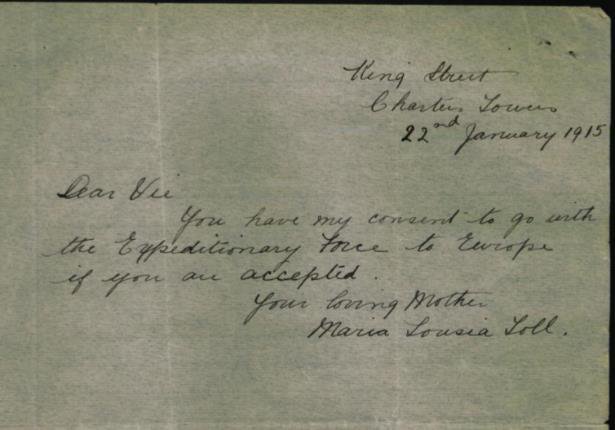
Viv has no known grave but is commemorated on the Lone Pine Memorial (Panel 50). He is also commemorated in the north Queensland town of Mareeba where a street was named Toll Close in his honour as one of about fifteen local First World War soldiers who lost their lives.
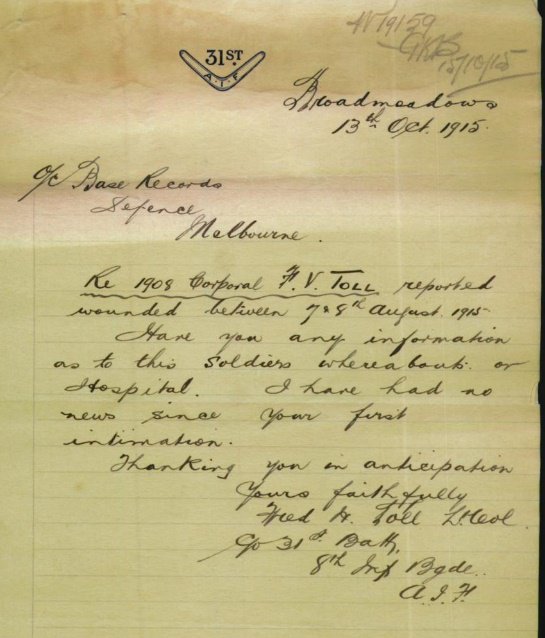
Post-war Toll’s service continued
Returning to Australia in March 1919, Frederick Toll’s appointment to the AIF was officially terminated in May. He later became Commissioner for war service homes and also followed his father’s construction and timber interests by managing timber businesses in Queensland including in Brisbane and Mackay.
Colonel Toll was a foundation member of the Returned Sailors' and Soldiers' Imperial League of Australia, later to become the RSL. He was its Brisbane vice-president in 1924-27 and Mackay president in 1928-30. In 1939, he was awarded an M.B.E. for his extensive social and charitable work with ex-servicemen and their dependents. In addition to his work with the RSL, Colonel Toll was secretary of the Brisbane Legacy Club for some time.
In poor health, Colonel Toll returned to Brisbane in 1930 for medical attention and settled at Woody Point. Toll had remained on the reserve of officers but his placement on the Retired List was officially gazetted in February 1932 after which he remained an honorary colonel with permission to wear the prescribed uniform. However, with the outbreak of World War II, he was back in service as district manpower officer for Queensland, then services liaison officer.
In his later years, Colonel Toll began collecting material for a book on the Boer War. At least some of these papers – together with some World War 1 material - were donated to the State Library of Queensland.
Colonel Fred Toll died aged 83 in 1955 having outlived his two children and his two wives – leaving his grandson, Roy Vivian Radecki, his only surviving descendant. After his long life of service, Frederick Toll’s ashes are interred with those of his daughter, Stella, and second wife, Maria, in the Mt Thompson Memorial Garden at Holland Park in Brisbane.
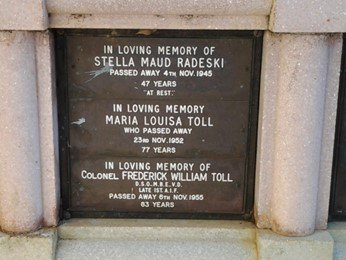
The Fromelles Association have been working with the Maryborough Historical Society on this research project, and many others, and are delighted to confirm that at the time of writing, they are in communication with the wider Toll family.
The 31st Battalion Association have also invited members of Fred Toll’s wider family to 31st Battalion church services in Townsville in recent years. In addition, Colonel Mark Plath (retd) – great grandson of Fred Toll’s younger brother – gave the address at the Association’s Battle of Fromelles commemoration at the Ipswich General Cemetery on 19 July 2020.
Colonel Frederick Toll’s service remains remembered and honoured to this day.
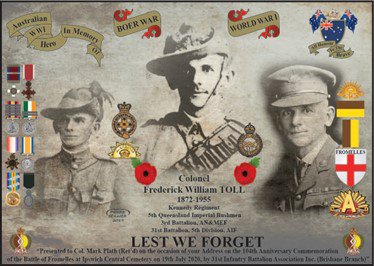
The Fromelles Association would love to hear from you

Contacts
(Contact: royce@fromelles.info or geoffrey@fromelles.info).
(Contact: army.uwc@defence.gov.au or phone 1800 019 090).
Donations
If you are able, please contribute to the upkeep of this resource.
(Contact: bill@fromelles.info ).
